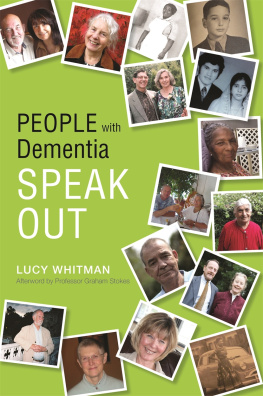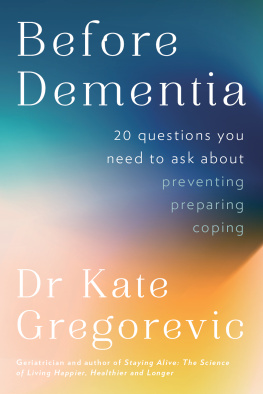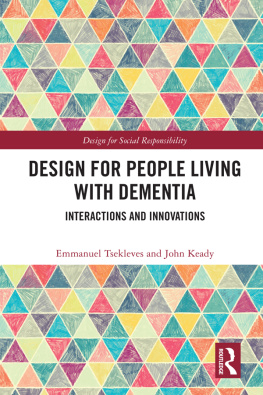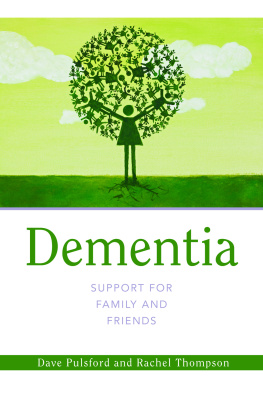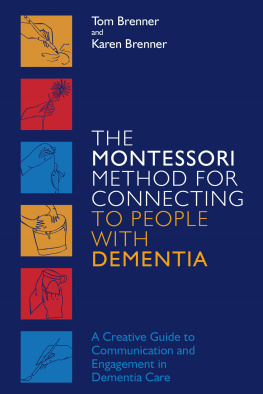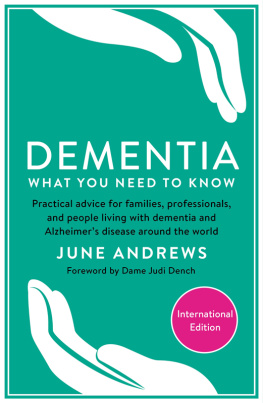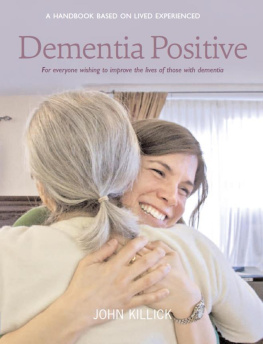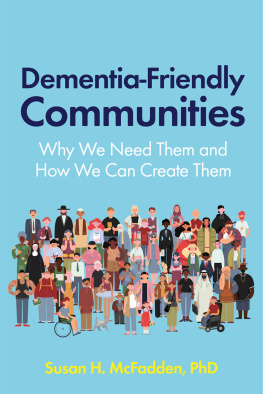
Although I have read many books on dementia in the four years since I was diagnosed with Alzheimers disease, seldom have I engaged with one that has informed and moved me as much as this one. Lucy and her co-authors will inspire, challenge and yet reassure you in equal measure, whether you are affected by dementia personally, or are a professional caring for us. The people in this book speak out through story-telling, conveying a human narrative around living well with dementia. The message they all so sincerely convey is based upon everyone being different, with personhood at the centre, whilst sharing a common bond and a desire to reduce stigma and misunderstandings, and replace them with hope and belief.
Keith Oliver, Dementia Service User Envoy, Kent &
Medway NHS and Social Care Partnership Trust
People with Dementia Speak Out is a celebration of people living, loving, learning, changing and growing with dementia. It is a rich and multi-dimensional collection of first-person accounts from people living with dementia. Each story combines peoples reflections on their life stories which are hugely diverse woven together with accounts of their growing awareness of difficulties and the impact of dementia on their lives. These stories are about identities and how dementia becomes another aspect of peoples lives but not the only aspect.
This collection has been thoughtfully edited by Lucy Whitman, who usefully shares her reflections on a complex editorial process that succeeds in retaining the diversity of experience, personality and language style that in turn helps to convey the realities the highs and lows of how dementia is incorporated into peoples lives and identities and the sheer resilience with which people respond to such major life changes.
Peoples voices, wishes, hopes and concerns ring out from every page of this book. This is a must-read for those who want to hear and understand the voices of people who are living with dementia.
Rachael Litherland, Co-director, Innovations in Dementia CIC
It is clear from this book that people living with dementia are engaged in a daily struggle to retain their distinctive individual personalities and identities linked to their own specific histories and life stories. It is therefore gratifying to see the care, skill and subtlety deployed in this volume to capture the unique voices and turns of expression of the participants, including where these occasionally conflict with the conventions and norms of written standard English.
Dr Roxy Harris, Centre for Language, Discourse &
Communication, Kings College London
Everyone working in dementia care should read this important book. Powerful and moving, these stories drive home what must be the guiding principle of all our work: to see and know each person as an individual all the way from first contact to later difficult times. Many contributors relate a stark lack of support after diagnosis but there are bright lights of positive services too, highlighting especially how vital mutual support groups can be.
Sue Benson, Managing Editor, Journal of Dementia Care
In a better world, Lucy Whitmans book would be required reading in schools. It brings alive the experience of living with dementia through the stories of people from all walks of life in the UK, and eloquently illustrates the theme of the 2013 report by the All Party Parliamentary Group on Dementia: Dementia does not discriminate . Importantly, Lucy has made every effort to ensure all the contributors tell their story in their own way. A valuable, evocative and commendable testimony to the importance of seeing the person, not the dementia.
David Truswell, NHS Senior Project Manager & Trustee of Culture Dementia UK
I read Lucy Whitmans first book Telling Tales About Dementia: Experiences of Caring and found it riveting. I frequently recommend it as essential reading for those working in this field. It presents an expertly edited text that accurately reflects a range of carer experiences. Shortly after its publication she mentioned to me that she was considering a sister text that portrayed the experiences and narratives of people with dementia to which I stated that this would be an excellent accompaniment to Telling Tales . We are starting to see an emerging number of books that give first-hand narrative to what it is to have dementia. People with Dementia Speak Out, Lucys second edited text, makes a valuable contribution to this small but growing body of knowledge.
Karen Harrison Dening, Director of Admiral Nursing, Dementia UK
Make no mistake, this is a major work of scholarship, as well as taking us several steps forward in understanding the significance of dementia to individuals and their need for appropriate help.
These are not tales of sorrow and suffering. In every one, the main theme is the whole life story of the PERSON. Dementia comes as but one experience, one part of one period the final period woven onto and into a fabric that has lasted years.
There is much wisdom here. These stories will bring smiles and tears, anger and determination. Most importantly they will spread a better understanding and hopefully we will use this to best effect.
Professor David Jolley, Consultant Psychiatrist and Honorary
Reader in Old Age Psychiatry, University of Manchester
People with Dementia Speak Out
by the same author
Telling Tales about Dementia
Experiences of Caring
Edited by Lucy Whitman
Foreword by Joanna Trollope
ISBN 978 1 84310 941 9
eISBN 978 0 85700 017 0
of related interest
Nothing About Us, Without Us!
20 years of dementia advocacy
Christine Bryden
ISBN 978 1 84905 671 7
eISBN 978 1 78450 176 1
Dancing with Dementia
My Story of Living Positively with Dementia
Christine Bryden
ISBN 978 1 84310 332 5
eISBN 978 1 84642 095 5
Can I tell you about Dementia?
A guide for family, friends and carers
Jude Welton
Illustrated by Jane Telford
ISBN 978 1 84905 297 9
eISBN 978 0 85700 634 9
PEOPLE with
Dementia
SPEAK
OUT
EDITED BY LUCY WHITMAN
Afterword by Professor Graham Stokes

Jessica Kingsley Publishers
London and Philadelphia
First published in 2016
by Jessica Kingsley Publishers
73 Collier Street
London N1 9BE, UK
and
400 Market Street, Suite 400
Philadelphia, PA 19106, USA
www.jkp.com
Copyright Jessica Kingsley Publishers 2016
Afterword copyright Graham Stokes 2016
All rights reserved. No part of this publication may be reproduced in any material form (including photocopying or storing it in any medium by electronic means and whether or not transiently or incidentally to some other use of this publication) without the written permission of the copyright owner except in accordance with the provisions of the Copyright, Designs and Patents Act 1988 or under the terms of a licence issued by the Copyright Licensing Agency Ltd, Saffron House, 610 Kirby Street, London EC1N 8TS. Applications for the copyright owners written permission to reproduce any part of this publication should be addressed to the publisher.
Warning: The doing of an unauthorised act in relation to a copyright work may result in both a civil claim for damages and criminal prosecution.
Library of Congress Cataloging in Publication Data
A CIP catalog record for this book is available from the Library of Congress
British Library Cataloguing in Publication Data
A CIP catalogue record for this book is available from the British Library
Next page
